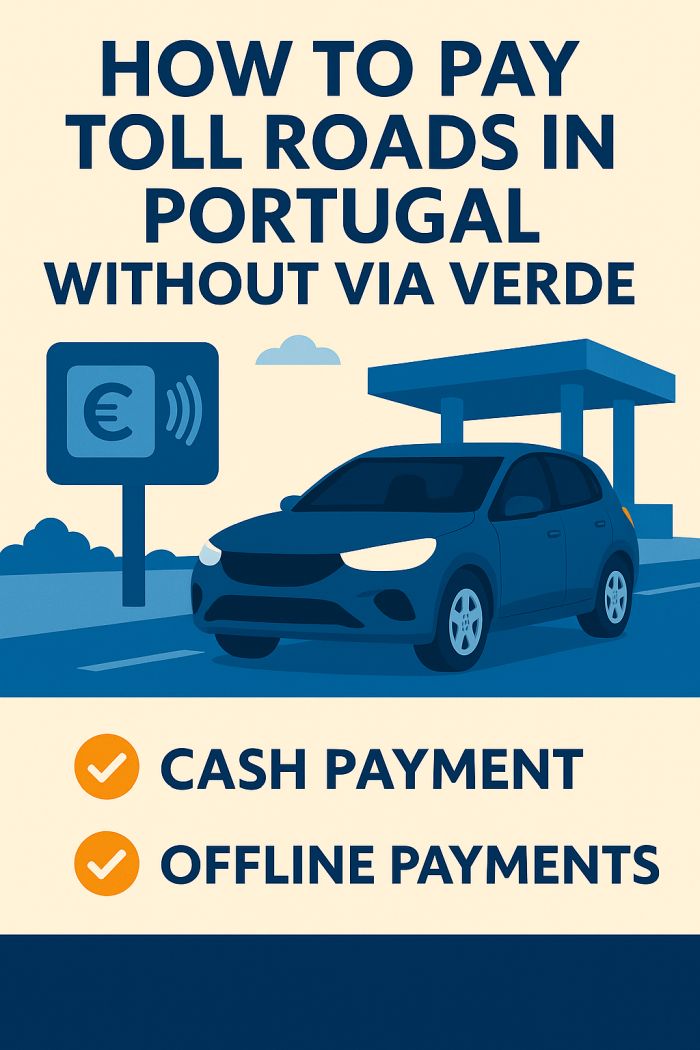Yes. Most Portuguese highways (called “Autoestradas”) are toll roads. If you rent a car, you’ll likely drive on routes like A1, A2, A22, or A28 – all of which require toll payment.

How Toll Roads Work in Portugal
There are two types of toll systems:
| Type of Toll | Description |
|---|---|
| Traditional | You stop and pay with cash or card at booths. |
| Electronic (Portagens Electrónicas) | No booth – your car is scanned automatically. |
For rental cars, electronic tolls are the most common issue travelers face — especially on roads like A22 (Algarve), A28 (Porto), and A25 (to Spain).
3 Easy Ways to Pay Tolls with a Rental Car
1. Via Verde (Most Convenient)
Many rental cars come with a Via Verde transponder on the windshield. It lets you drive through tolls without stopping. The charges are billed to you later.
Tip: Confirm with your rental company if the car includes Via Verde.
💸 Don’t Overpay at the Airport
Compare real-time rental deals with no hidden fees or credit card needed.
2. Prepaid Toll Card
You can buy a Toll Card and register your rental plate number. Best for travelers without Via Verde.
- Sold at CTT post offices or online.
- Preload with €10–€40.
3. Pay After Driving (If No Transponder)
Some tolls allow post-payment within 5 days, but not all. This option is risky and often leads to fines if missed.
What Happens If You Don’t Pay?
- Fines of €25–€150 per toll
- Your rental agency may charge your credit card later
- Some companies add administrative fees
Which Roads Are Toll Roads in Portugal?
| Road | Region | Toll Type |
|---|---|---|
| A1 | Lisbon – Porto | Traditional |
| A2 | Lisbon – Algarve | Mixed |
| A22 | Algarve | Electronic |
| A25 | Aveiro – Spain | Electronic |
| A28 | Porto – Viana do Castelo | Electronic |
How to Know If You’re on a Toll Road?
Look for signs:
- “Portagem” = Toll
- Green signs = Paid highways
- Blue signs = Free national roads (N-roads)
How to Avoid Tolls in Portugal
- Use Google Maps with “Avoid tolls” option
- Stick to N-roads (like N125 in Algarve)
- Budget extra time — they’re slower but scenic
Rental Companies & Toll Policies
| Company | Via Verde Included? | Notes |
|---|---|---|
| Sixt | Often yes | May charge daily transponder fee |
| Europcar | Optional | Check during pickup |
| Avis/Budget | Optional | Prepay packages available |
| Discovercars | Varies | Compare offers in advance |
FAQ – Tolls and Rental Cars in Portugal
Can I refuse the Via Verde device?
Yes, but you’ll need to manually pay or register each toll — much harder.
Is Via Verde worth it?
Absolutely. It’s stress-free, especially if you’re driving in Algarve or Porto.
Will I get fined if I don’t pay?
Yes. Most unpaid tolls are automatically billed + fines + admin fees.
✅ Final Thoughts
Driving in Portugal is a joy, but tolls can be tricky. If you’re renting a car, the best option is to get a Via Verde device, understand the roads you’ll use, and avoid the stress of unpaid fees or fines.
